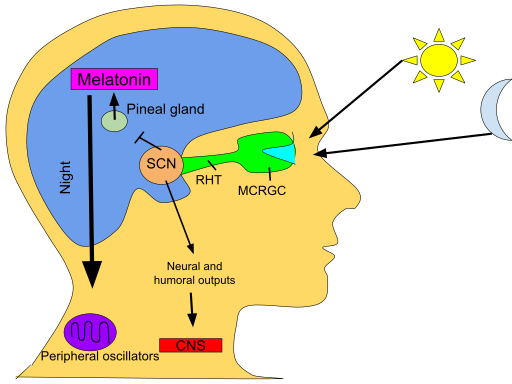Melatonin and its effect on longevity, sleeping, and Reproduction
2 comments
Several animals especially reptiles have third eyes, and this third eye contains receptors but this is absent in mammals but we have a vestigial remnant of the third eye which is the pineal gland. Before now, we just believed that the pineal gland was a non-functional remnant but it is no longer so following evidence that shows that the gland plays a role in sex, reproduction, promotion of sleep, enhancing mood, warding off infection, and it has been linked with longevity up to 10 to 25%. This is possible thanks to the secreting melatonin.
Just deep within the center of our brains is where the pineal gland is located. Close to the pituitary in the brain, the gland which is small in size weighing within 0.1 to 0.2 grams is very important to us as humans. It is very important in our sleep as it controls the circadian rhythm which is the body's internal clock which tells us when to go bed and when to wake up even when we are not looking outside to see if there is sunrise or sunset and even without checking time. This gland does so by secreting a hormone known as Melatonin which is usually triggered by light or the absence of light.

https://commons.wikimedia.org
In our brain (a proper functioning brain), when we notice light after which our eyes have perceived it, it sends a message to the Suprachiasmatic Nucleus in the hypothalamus which would then inform the pineal gland to reduce the production of melatonin hormone but when there is no light like during the days when the national grid of Nigeria falls, and there is no way to power your house at night, you begin to fall asleep very fast because with no light comes increased melatonin.
Some people take melatonin as supplements when they have difficulty sleeping but while people use melatonin supplements for sleep difficulty, is melatonin just for sleep purposes? The answer is no and I mentioned this at the beginning of this post. One of the areas where melatonin plays a role in is in the case of Sex and Reproduction.

https://www.freemalaysiatoday.com
It is important in the case of animals basically mammals that have seasonal fertility and this is triggered when the survival of both mother and offspring are more likely. In the days of less daylight and more darkness, there will be release of melatonin to reach the pituitary gland which inhibits the release of Follicle-Stimulating Hormone (FSH), and Luteinizing Hormone (LH) in the ovaries which could affect the reproductive cycle of the animals but there are still researches going on about if this affects humans and it is still unknown since humans reproduce all round the season.
When it comes to mood, melatonin also places a role in it and example of this is with seasonal affective disorder which is a type of depression that can happen usually during winter and fall because the daylight is reduced and it is associated with excessive amount of melatonin. When it comes to longevity, scientist have been working on a relationship between melatonin and longevity. Scientific research was done on mice where pineal glands from younger mice were transferred into older mice, and it showed a significant increase in their lifespan compared to control groups. Researcher came with the theory that the mice lived longer because of the circadian rhythm of the mice were restored properly after the pineal gland transfer, also there was an enhanced antioxidant protection since melatonin is an antioxidant.
We cannot say because melatonin has this benefits, we should begin to pump ourselves with melatonin because the research is quite new, and the majority of these experiments are done on lab rats and this doesn't translate to the same effect on humans.
Read More
- https://www.ncbi.nlm.nih.gov/books/NBK550972/
- https://www.yourhormones.info/glands/pineal-gland/
- https://www.ncbi.nlm.nih.gov/books/NBK525955/
- https://pmc.ncbi.nlm.nih.gov/articles/PMC1855314/
- https://touroscholar.touro.edu/cgi/viewcontent.cgi?article=1138&context=sjlcas
- https://www.nimh.nih.gov/health/publications/seasonal-affective-disorder
- https://pmc.ncbi.nlm.nih.gov/articles/PMC4673349/
- https://healthmatch.io/seasonal-affective-disorder/melatonin-seasonal-affective-disorder

Comments